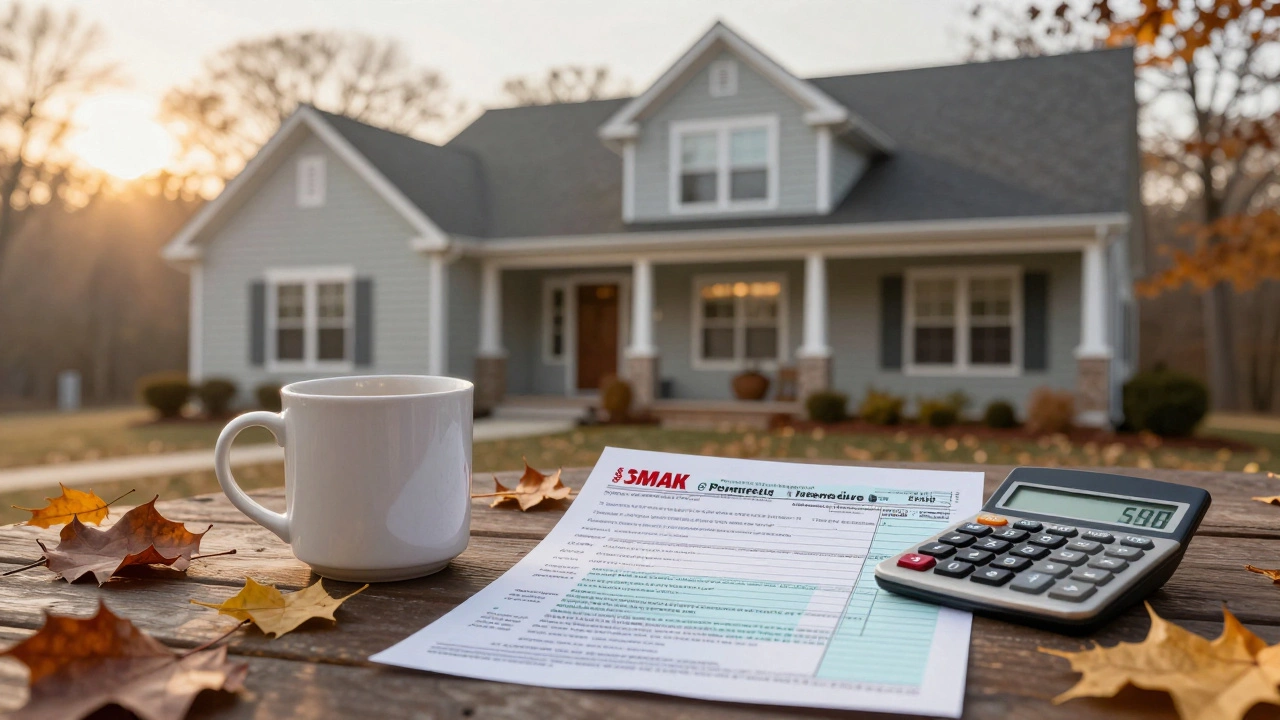If you’re hoping to cash in on a commercial property sale, don’t just stare at the listing price and start dreaming about fancy holidays. The money you actually take home is almost always less than what you expect. It’s all about the breakdown—the real numbers you get after commissions, fees, taxes, and a few surprises nobody talks about at those first real estate meetings.
Most folks forget the variety of people dipping into a sale—real estate agents, legal advisors, government agencies—each has a hand out for their slice. Knowing exactly who gets what helps you plan better and makes negotiations smoother down the road. Here’s what really happens when it comes time for your commercial payday.
- The Basic Math Behind a Commercial Sale
- What Really Impacts Your Final Payout
- Hidden Costs and Common Surprises
- Smart Tips for Maximizing Your Sale Profit
The Basic Math Behind a Commercial Sale
Let’s clear something up: The big eye-catching number on your property listing isn’t what ends up in your bank account. Your real take-home hinges on a web of commissions, taxes, and other charges. If you want a straightforward answer, you need to understand each cut that happens between handshake and payday.
The key player here is the commission, usually paid to the real estate broker or agent who secures the deal. For commercial property sale deals in the US, the typical commission falls anywhere from 4% to 8% of the sale price, depending on location, property size, and how tough the deal is. On a $2 million warehouse, a 6% commission would mean $120,000 gets sliced off right away—split between the seller’s and buyer’s agents (if there are two separate agents involved).
| Sale Price | Commission Rate | Commission Total | Estimated Take-Home (Before Other Fees) |
|---|---|---|---|
| $1,000,000 | 6% | $60,000 | $940,000 |
| $2,000,000 | 5% | $100,000 | $1,900,000 |
| $5,000,000 | 4% | $200,000 | $4,800,000 |
Besides the agent’s commission, you’ll run into closing costs. These typically land between 1% and 3% of the sale price and cover stuff like escrow fees, title insurance, and legal paperwork. Don’t forget state and local taxes, which can sometimes reach another 3%, depending where your property sits. It adds up quick.
Here’s a quick formula just to keep you grounded—it’s not exact, but it’ll save you from nasty shocks:
- Start with the sale price.
- Subtract the agent’s commission.
- Subtract your closing costs.
- Subtract any applicable taxes and fees.
And that’s before you think about any mortgage payoff or repair credits to the buyer. Getting the math right up front is the only way to avoid disappointment (or worse, scrambling for cash) after the sale.
What Really Impacts Your Final Payout
Shockingly, the price on your property listing has little to do with the actual money you get in your account. Several big factors bite into your payout—sometimes by a huge margin. If you don’t calculate these up front, you’re almost guaranteed a nasty surprise at closing.
The biggest chunk usually goes to commissions. In most places, a commercial real estate broker takes 1% to 6% of the sale price. Let’s say you close at $1 million—just the broker can make anywhere from $10,000 to $60,000 off your deal.
Here’s a simple breakdown of what often eats into your final number:
- Commission for your commercial broker
- Legal fees (think lawyer fees for drafting contracts and handling paperwork)
- Transfer taxes or stamp duty (depends on your local laws)
- Outstanding property taxes (if you haven’t paid up for the year)
- Bank fees (if clearing a mortgage or releasing liens)
- Repairs or upgrades requested by the buyer
- Marketing costs (signage, digital ads, professional photos)
And each of these items isn’t just nominal. Legal fees for commercial sales typically land between $3,000 and $10,000—much heftier than your average house sale. Transfer taxes can range from 1% to 5% of your sale price, depending on the location. That’s another big deduction, right off the top.
Check out this quick snapshot to see how a $1 million commercial property sale payout might shake down:
| Deduction | Typical Range |
|---|---|
| Broker Commission | 1%–6% ($10,000–$60,000) |
| Legal Fees | $3,000–$10,000 |
| Transfer Tax/Stamp Duty | 1%–5% ($10,000–$50,000) |
| Outstanding Taxes | Varies |
| Repairs/Upgrades | $0–$50,000+ |
| Marketing/Other | $2,000–$15,000 |
So, if you sell for $1 million, you might very well walk away with $850,000—or even less. Always ask for a detailed breakdown from your agent before accepting any offer. And don’t forget to check your mortgage statement—if you owe more, that will take an even bigger bite out of your earnings.

Hidden Costs and Common Surprises
So, you’ve agreed on a sale price. But suddenly, the numbers on your bank statement look smaller than you thought. That’s when hidden costs hit you. Sellers constantly get surprised by expenses no one warned them about upfront. These can make a big dent in your profit from a commercial property sale.
First off, you’ll get hit with transfer taxes. Depending on where your property is, this can range from 1% up to even 6% of the sale price—sometimes more in bigger cities. Next comes title insurance and escrow fees, which easily eat up thousands. Most buyers expect you, the seller, to cover a good chunk.
Ever heard of due diligence surprises? This happens when the buyer sends in inspectors who find code violations or required repairs. Suddenly, you may need to fix a parking lot, replace an HVAC system, or deal with old asbestos. These add-ons are usually not part of your first plan, but they can’t be ignored if you want the deal to close.
Legal fees also creep up. Sure, you expect paperwork, but when deals get tricky—say, a tenant won’t leave or there’s an old easement issue—attorneys bill by the hour. Then there’s broker admin costs, marketing fees for fancy listings, and utility adjustments. Don’t forget early loan payoff penalties if you’re carrying a mortgage. Banks sometimes charge several months’ interest just for paying off your loan early.
| Hidden Cost | Common Range per Transaction |
|---|---|
| Transfer Taxes | 1-6% of sale price |
| Title Insurance | $2,000 - $6,000 |
| Escrow Fees | $1,500 - $8,000 |
| Repairs & Compliance | $5,000 - $50,000+ |
| Legal Fees | $3,000 - $20,000 |
| Early Loan Payoff | 1-6 months' interest |
Another big surprise? Capital gains tax. Depending on your holding time and personal tax bracket, you could owe up to 20% (or higher in some states) on your profit. Forgetting this one means a nasty shock when tax season rolls around.
To dodge nasty surprises, it pays to ask for a full, itemized statement before the deal gets too far. Get everything in writing, double-check with your accountant and lawyer, and don’t assume it’s all wrapped up in the agent’s commission. The best move is being ready for at least 8-10% of the sale price to vanish in these costs and surprises before you see your net profit.
Smart Tips for Maximizing Your Sale Profit
Want to walk away with more cash from your commercial property sale? Here’s where attention to detail pays off big. You’ve got a lot on the line, and a few smart moves can boost your payout way past the average owner’s expectations.
- Timing the Sale: Commercial markets have busy and slow seasons, just like residential. In the U.S., for example, the first half of the year typically sees more sales activity. Keeping an eye on interest rates and local trends can mean the difference between a bidding war and lukewarm interest.
- Spruce Up the Property—But Don’t Overdo It: Simple upgrades like a fresh coat of paint, a deep clean, and fixing obvious repairs boost curb appeal far more than expensive remodels. According to CBRE’s 2023 market report, cosmetic improvements alone can increase offers by 3-7% on average.
- Hire the Right Broker: Not all brokers are created equal. A specialist in your type of property, with local market experience, usually negotiates higher sale prices. Check their recent sales stats before signing a contract. And always negotiate the commission—rates aren’t set in stone.
- Understand Your Tax Hit: Commercial property profits are taxed differently in every region. Bring in a good accountant early to strategize, especially around capital gains and possible deductions. Planning ahead can sometimes save you tens of thousands.
- Be Upfront with Info: Buyers pay more when they trust what they see. Have complete paperwork ready—leases, maintenance logs, compliance certificates—all of it. Transparency speeds up deals and cuts down on haggling.
- Market Like a Pro: Don’t just rely on your broker—get hands-on. High-quality photos and direct outreach through business networks or LinkedIn can draw serious buyers who might have missed the standard listings.
Here’s what the profit breakdown often looks like for a typical U.S. small business property sale:
| Sale Price | Broker Commission (Avg. 6%) | Closing Costs | Taxes (Est.) | Net Payout |
|---|---|---|---|---|
| $1,000,000 | $60,000 | $15,000 | $140,000 | $785,000 |
| $2,500,000 | $150,000 | $25,000 | $350,000 | $1,975,000 |
The numbers don’t lie—the more prepared and strategic you are, the more of that hard-earned money stays in your pocket. When it comes to commercial property sale, every percent adds up fast. Don’t leave those gains on the table for someone else.





